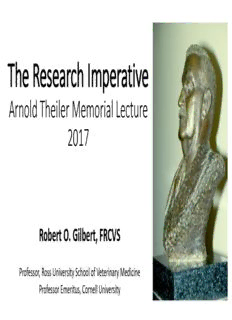
The Research Imperative Arnold Theiler Memorial Lecture PDF
Preview The Research Imperative Arnold Theiler Memorial Lecture
The Research Imperative Arnold Theiler Memorial Lecture 2017 Robert O. Gilbert, FRCVS Professor, Ross University School of Veterinary Medicine Professor Emeritus, Cornell University Outline • Personal research in postpartum uterine disease of dairy cows • Reflections on research more generally • Production animal research • Research in veterinary practice • Academic practice • Private practice • The research imperative • For Society and the Profession • For Universities • For individuals Up to circa 1990 • Most agreed “endometritis” was bad for reproduction • Several disagreed • Miller HV, et al., Bov.Pract. 1980 • Griffin, Hartigan & Nunn, Theriogenology, 1974 a,b • Diagnosis • N. America: palpation and visible exudate • Incidence < 20 % • Europe: vaginoscopy • Incidence ~ 40 % Maurice E. “Pete” White Editor, Cornell Veterinarian Creator, “Consultant” Bovine Endometritis: The burden of proof. Cornell Vet., 1992 Endometrial cytology Endometrial cytology Endometritis • Cows at 40 – 60 days postpartum • End of voluntary waiting period • 5 dairy herds in Central New York • Endometrial cytology • No further involvement in management • Followed up via dairy records Endometritis Survival Analysis Effect of Endometritis at 7 weeks 1.0 Endometritis-negative Endometritis-positive 0.8 n e p 0.6 O n 158 days P = 0.002 o 122 days ti r o p o r P 0.4 30% censored 0.2 P = 0.003 18% censored 0.0 0 50 100 150 200 250 300 350 Time (Days) Some central questions • Which pathogens are primarily responsible for endometritis? • Which metabolic and immune factors mediate susceptibility to and pathogenesis of endometritis? • How does endometritis mediate infertility? Which pathogens cause endometritis? • Most cows have postpartum uterine bacterial infection • Only a subset develops disease • Extensively studied by conventional means • Mixed postpartum population initially judged to be insignificant (Griffin, Hartigan, Nunn, 1974) • Persistence of Trueperella pyogenes beyond 21 days detrimental to fertility • Synergistic action of T. pyogenes and gram-negative anaerobes established • F. necrophorum, P. melaninogenica, Bacteroides spp.
Description: